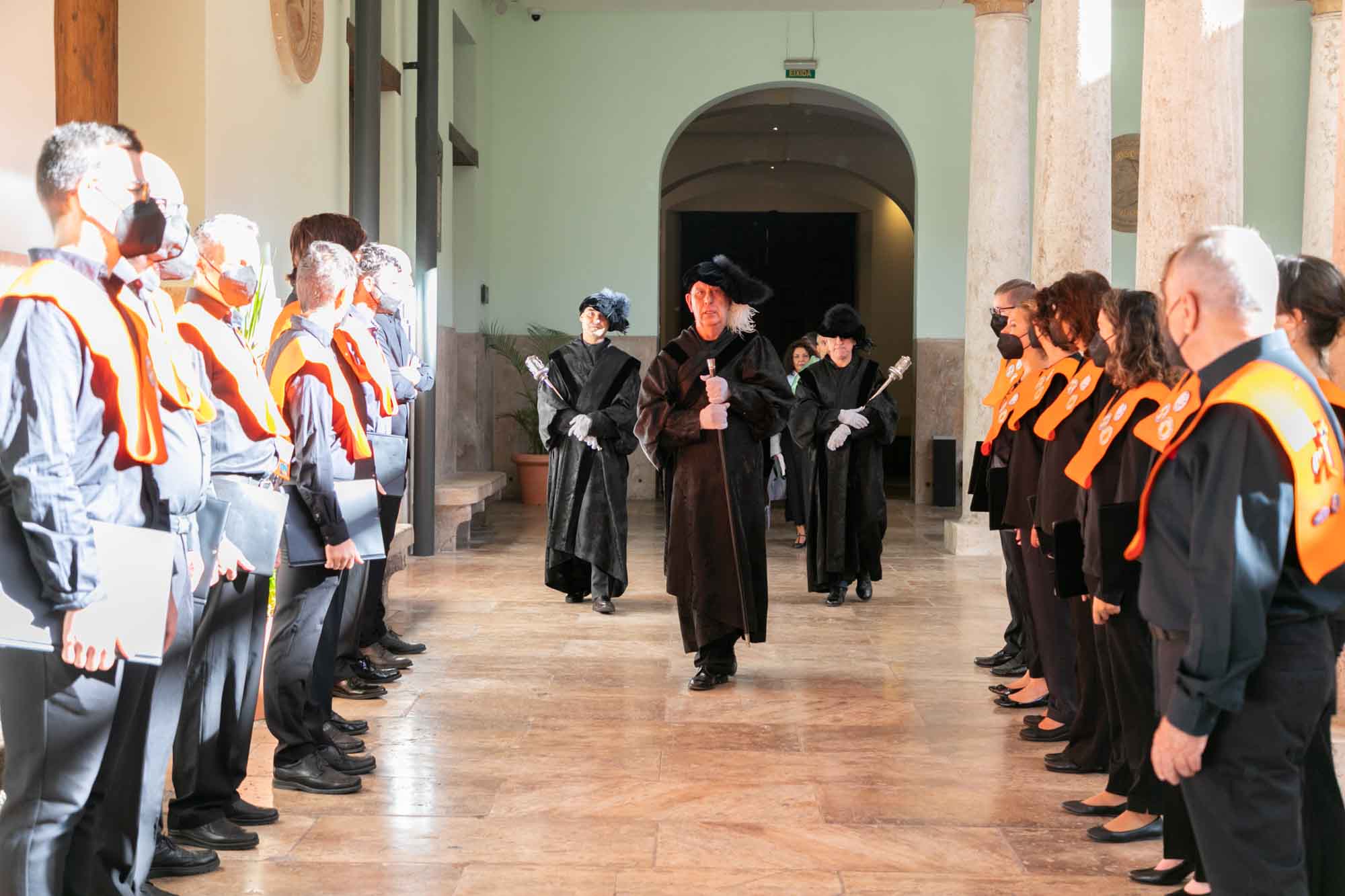Official opening of the 22-23 academic year at the Universitat de València
- Office of the Principal
- September 9th, 2022
In the framework of a solemn academic act that has returned to the Paraninfo (Main Hall) after the time of pandemic, this Friday 9th September the Principal has officially declared open the academic year 2022-2023 at the Universitat de València. Classes will start on Monday 12th September.
After two years in which, due to the application of measures to contain the spread of the COVID-19 pandemic, the academic act had been replaced by an institutional act held in the cloister, the Universitat de València has resumed the historical tradition and has officially declared the 2022-2023 academic year open during a solemn academic act.
Thus, the Paraninfo (Main Hall) of the historic building on Carrer de la Nau, now the University Cultural Centre, hosted the ceremony, which was attended by a broad representation of the executive, legislative and judicial powers, trade union and business organisations, public and private universities, affiliated centres, armed forces and police forces, town councils and professional associations.
The completion of the preventive measures against the spread of COVID-19 established by the health authorities means a return to the Paraninfo and the classic format of the academic event, with the return of the lectio, the master lecture, which takes place every year in a centre.
This year, the opening ceremony was once again attended by the Choral Society, which performed the academic hymns Veni Creator at the beginning of the session and Gaudeamus Igitur at the end, and the teaching staff once again wore the dress corresponding to their doctoral degree, forming an academic procession.
The master lecture was given by the School of Engineering (ETSE), the centre that was to deliver it in 2020, and which has appointed Professor Enrique Dedé, emeritus professor of electronic technology, to take on this task.
‘Past, present and future of electronics and the influence of the Universitat de València in its development in the Valencian Community' was the title of the lecture given by Dr Dedé.
You can read this masterclass by following this link: https://www.uv.es/rectorat/discursos/obertura/22_23/lectio.pdf
UV is first in stabilising research staff in the Gent programme
The Councillor for Universities, Science and Digital Society, Josefina Bueno, who participated on behalf of the Valencian government, stressed that 'training, research and knowledge transfer are three of the priority axes of our recovery and progress' and that these 'come from public universities and the talent that is trained in them'.
In this sense, he stressed that the Valencian government has invested in talent through the GenT Plan, highlighting that the Universitat de València is the one that has welcomed more researchers from this programme.
The Councillor also stressed that the Universitat de València 'is the first that has already begun to stabilise GenT research staff', thus making 'the attraction, retention and generation of talent in our system a reality'.
The Universitat de València, leader thanks to the work of the university community
In her speech, the Principal of the Universitat de València highlighted the leading position of the UV according to the most prestigious international rankings that place us as the first of the Valencian universities, one of the top five Spanish universities, as well as among the three hundred best in the world, standing out in some disciplines in the hundred and two hundred best positions worldwide.
For the Principal, Mª Vicenta Mestre, this position is the result of the work of the entire university community, and has highlighted not only our volume of scientific production, but also the quality of the research work of the UV in terms of international citations.
In addition, she stressed that we are the first university in Europe in receiving students in international mobility programmes, that our students have better academic results than the Valencian and Spanish university systems as a whole, and that the Universitat de València is the first public university in Spain in terms of sporting results.
‘These results should make us proud of our University’, said the Principal, who added: 'we remind Valencian society that this historic University continues to be at the forefront of universities'.
Next year’s challenges: funding, collective bargaining and legislative changes
The Principal of the UV, Mª Vicenta Mestre, also pointed out that, in Spain, public investment in R&D&I represents 1.2% of GDP, which is half the OECD average, compared to the 3.2% of GDP allocated to these tasks in the United States.
‘Therefore, to be truthful, we have to stress that our position is much higher than it would be based on the amount of resources we have available for research. And this is due to the important effort made by our research staff, who often face the problem of job stability and promotion’, the Principal insisted.
Among the challenges for the 2022-2023 academic year, the Principal pointed out the need to abolish the replacement rate and the adaptation of ANECA accreditations to adapt them to the real profiles of professionals in the university system. It also aims to make research management lighter and more flexible by reducing the enormous amount of bureaucracy.
Regarding the legislative reform project, the Principal said that ‘the hope of a new Organic Law of the University System cannot be disappointed by a lack of specification or definition of the public university model for the next decade; nor can it be dashed by the approval of a law that does not have broad support within the university system itself’.
Regarding the collective agreement, agreed by the Generalitat (Valencian Government) with trade unions and universities, and not signed by the Generalitat due to state restrictions, the Principal has asked for 'a last effort' from the Valencian government to sign this agreement, which will improve the working conditions of assistant, doctoral assistant, doctoral contract and associate lecturers.
The Principal stressed that, 'despite the restrictions of state regulations on the replacement rate and budgetary limitations, we continue to make progress in improving the teaching and research staff' with almost two hundred stabilisation and promotion positions for this academic year.
‘We are facing the problem of the increase in the CPI, a strong underlying inflation that is accompanied by runaway energy costs’, said the Principal Mª Vicenta Mestre, who pointed out that in the meeting held this week with the minister of Finance and Universities, the work deadlines for the agreement of a new funding model for 2023 have been advanced. The Principal thanked the Regional Minister Josefina Bueno for her commitment to the university system and to making the new funding model a reality.
You can read the Principal's speech in full by following this link:
https://www.uv.es/rectorat/discursos/obertura/22_23/discurs_rectora.pdf
File in: Obertura de curs acadèmic

















